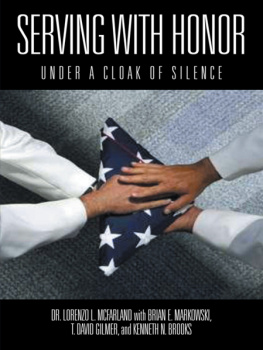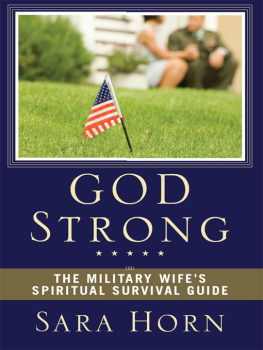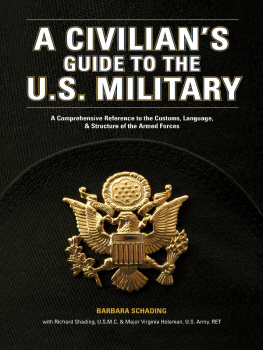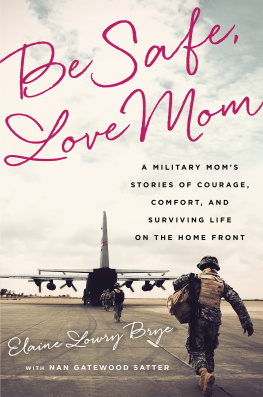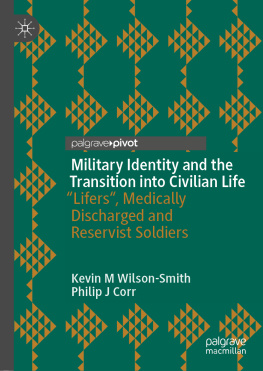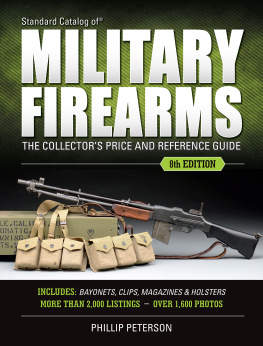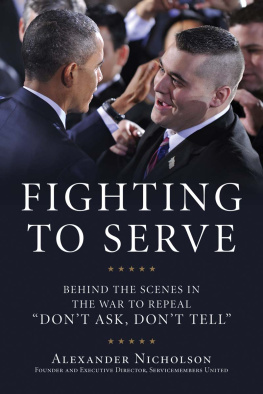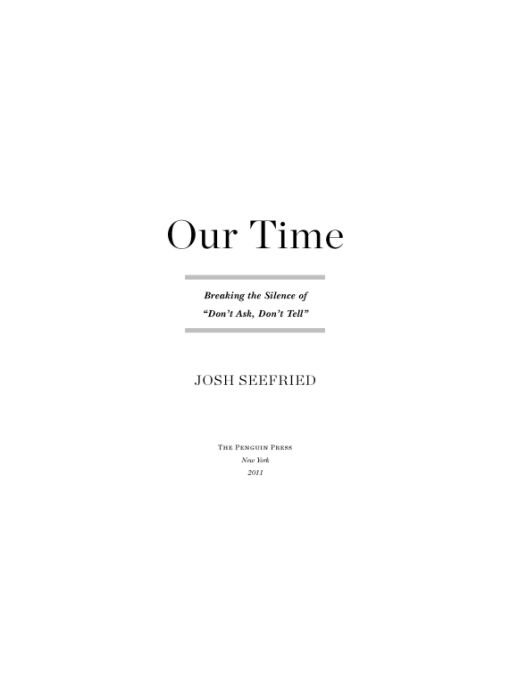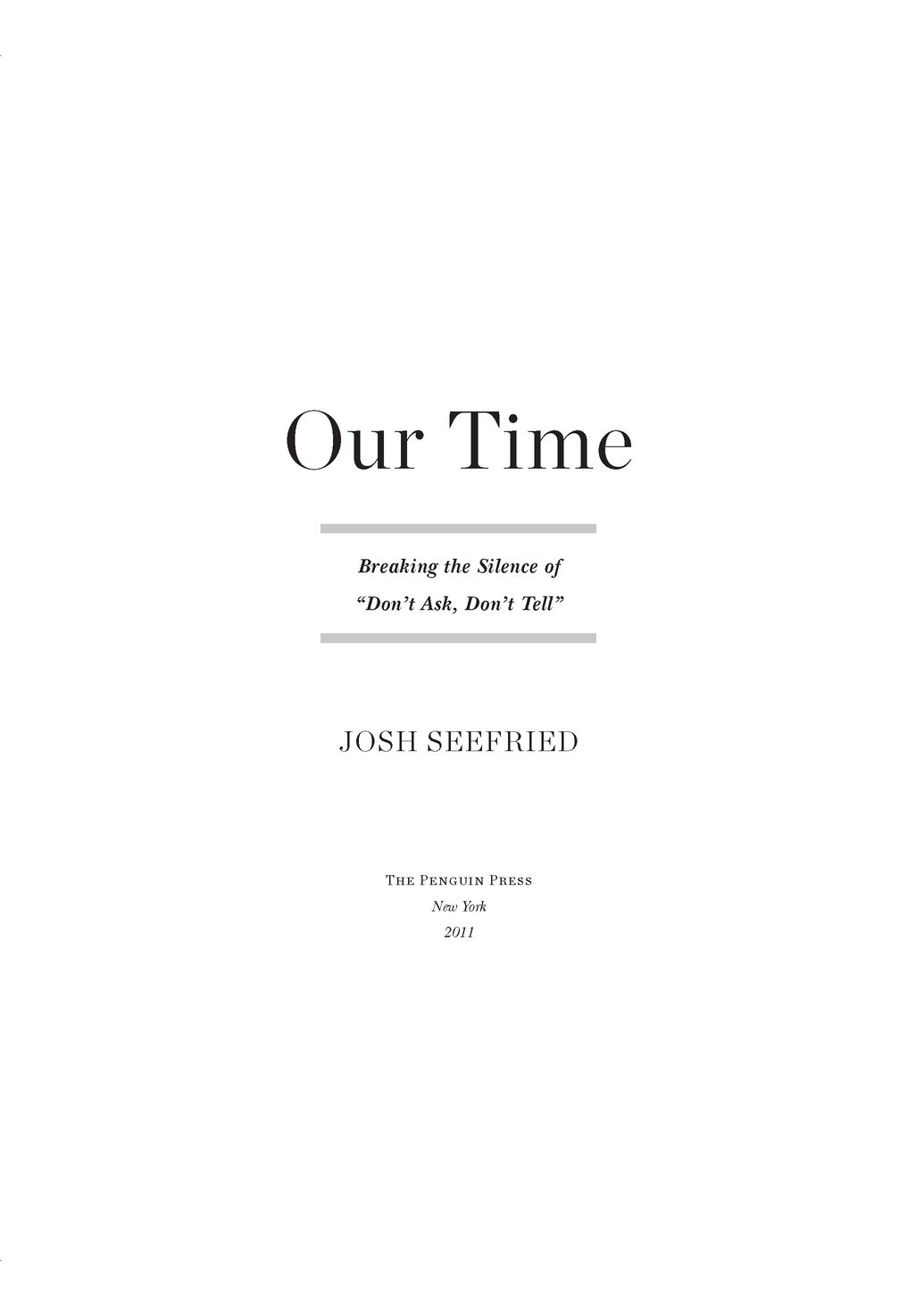Table of Contents
To all the gay, lesbian, bisexual,
and transgender service members
who have given their lives
for this great nation
AUTHORS NOTE
I asked contributors to share their stories after President Obama signed Dont Ask, Dont Tell legislation on December 22, 2010, but before the repeal became final on September 20, 2011. Because of the uncertainty during this interim period, some contributors chose to be identified by a pseudonym. Some contributors also chose to protect the identity of those they mentioned by using a pseudonym. All pseudonyms are identified by an asterisk after the name the first time the name appears.
The stories reflect the opinions of individual service members and those opinions do not necessarily reflect the opinions of their branches of service or of the Department of Defense.
PREFACE
Patrick Murphy
Patrick Murphy led the fight to repeal Dont Ask,
Dont Tell. He was Americas first Iraq war veteran
to serve in the U.S. Congress and represented
Pennsylvanias 8th Congressional District, serving
from 2007 to 2011. Captain Murphy earned the
Bronze Star for service in the Iraq War as a
paratrooper in the 82nd Airborne Division.
For seventeen years, a cruel irony hung over the debate on Dont Ask, Dont Tell. While politicians and talking heads offered a flurry of opinions on the issue, one important contingency could not participate in the discussion: the men and women whose lives hung in the balance. Because they could not serve openly, they also could not defend their right to openly serve the nation they loved.
In Our Time, the silence is finally broken and we hear the voices of the gay and lesbian service members who have borne this exceptional burden. We learn new truths from those most affected by DADT and gain perspective on the unjust policy.
As someone who served our country in combat and understands the pride and responsibility that comes from wearing our uniform, these stories resonate with me. The constant fear of investigation, the agonizing over who you can trust, and the pain of isolation were all familiar. Also familiar were the stories of tolerance, of soldiers who value their comrades on their performance alone.
Remarkable acts of courage are found throughout Our Time. In one account, a gay drill sergeant sees a gay recruit harassed by other drill instructors. The recruit struggles and ultimately attempts suicide. The drill sergeant resolves never to let that happen again and becomes a resource for gay recruits who might be at risk, inspiring and counseling them. He courageously risks his own career to help them succeed and serve our nation.
In another account, a soldier explains what its like to serve in Iraq when no one can know about your loved one at home. He needs to constantly police his language and mail, and is terrified that he might be betrayed and found out. The notion that a man is putting his life on the line for his country, but still has to hide his loved ones, is unconscionable to me as an American. Every person who puts on a military uniform to serve should be able to reach out to his or her familyincluding his or her partnerwithout fear. Thats why we worked so hard to finally end DADT.
Those of us who have been fortunate enough to lead troops never lose our love for our fellow soldiers, nor do we ever stop being thankful for their service. We owe our gratitude to the men and women who fight to defend our nation. Anyone who shares that appreciation for the bravery of our troops should read the stories of these young men and women who embody the best of our military values: honor, courage, and selfless sacrifice. They remind us why every man or woman who wants to serve our nation should have the opportunity to do so and why these heroes deserve the thanks of a grateful nation.
INTRODUCTION
President Barack Obama signed the Dont Ask, Dont Tell Repeal Act bill into law on December 22, 2010. Though it would be a few months until repeal took effect, that day marked the beginning of a new era for the American military. I sat in the audience during the signing ceremony that day as a representative of OutServe and as an active duty gay Air Force officer directly affected by the policy. It was thrilling to celebrate this hard victory alongside other advocates, but I also knew that despite the leap forward there remained a tremendous amount of work to be done. For seventeen years, the policy had effectively silenced an entire military population. The ways in which Dont Ask, Dont Tell had poisoned military culture remained untold.
I knew the negative effects of this silence firsthand. As a brand new officer at training school, I was blackmailed by an instructor who knew my orientation, but under Dont Ask, Dont Tell I had no real outlet to stop this abuse. It was this experience that pushed me to found OutServe, along with one of my closest civilian friends, Ty Walrod. The organization began small. In November 2009 my friends and colleagues, outraged by what had happened to me, formed a Facebook group and website titled Citizens for Repeal of Dont Ask, Dont Tell. Soon the page was gaining hundreds of followers daily. I knew that there were thousands of active duty LGBT service members who would benefit from having a support network, but this was proof. We moved quickly to create an underground social networking site for active duty LGBT service members. Until the formation of OutServe, there had been no safe way to create an organized LGBT community in the military. The risk of exposure was far too great. By providing identity security we were able to create a safe space where active duty military personnel could openly form friendships and voice concerns. To date, OutServe has successfully connected more than 4,000 LGBT military personnel around the world.
Our Time is our story of our military experience under Dont Ask, Dont Tell. The individuals you will meet in these pages served in silence. They were required to withhold an integral part of themselves from their colleagues. They could not freely share their love for their families or their dreams for the future. They had no protection when individuals used the Dont Ask, Dont Tell policy to blackmail and harass. However, as active duty service members themselves know, the silence of Dont Ask, Dont Tell was already beginning to break. The stories here are testament to the remarkable friendships that form between soldiers, relationships of respect and affection that transcend prejudice and prove just how very outdated and bankrupt the Dont Ask, Dont Tell policy was.
Throughout Our Time, you will note time and time again one word: integrity. This concept is a cornerstone of military education and tradition; it is a value we are taught to aspire to and to uphold. And yet Dont Ask, Dont Tell denied integrity to each and every LGBT service member. Every day these individuals were faced with a deep, wounding conflict: to be true to themselves or true to their country. The pain of that choice is felt in almost every story included here.
I reached out to contributors during the period after the repeal act was signed, but before Dont Ask, Dont Tell had officially ended. Sharing their stories during this uncertain moment was an act of bravery, and I thank each contributor for his or her work toward helping those outside the military understand just how damaging and far-reaching the effects of Dont Ask, Dont Tell were. Their courage in service of this book, however, is nothing compared to the courage and self-sacrifice our country required of every LGBT soldier who served under Dont Ask, Dont Tell. I also want to give special thanks to the straight active duty and family members who shared their experiences, and to the military personnel who served during the early years of the policy. Their words remind us of how far we have come.


